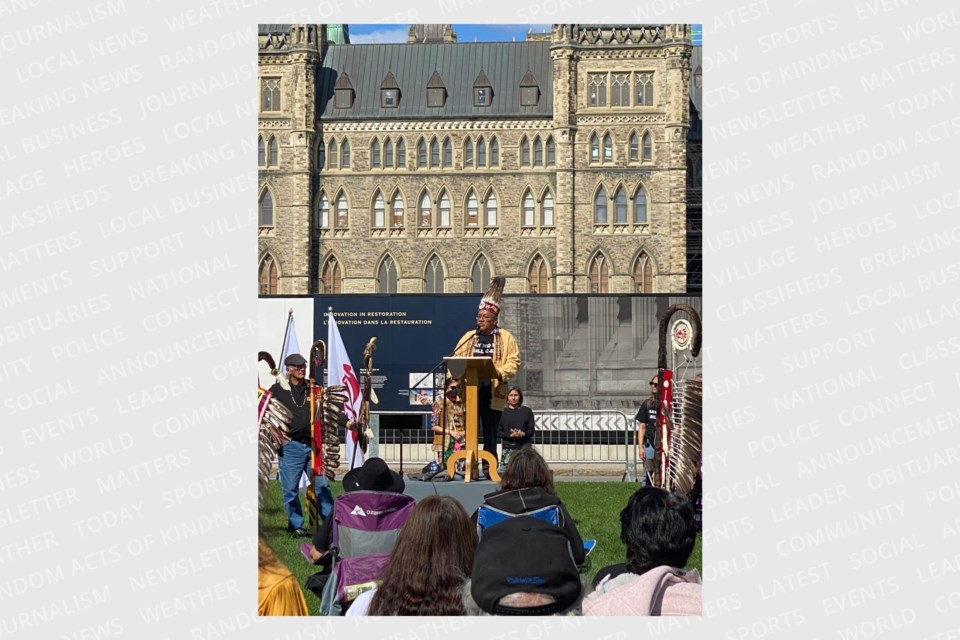CLARIFICATION: This article was updated after publication to include the names of all five authors of the academic report commissioned by Robinson Huron Waawiindamaagewin.
First Nations leaders and community members are in Ottawa today demonstrating against Bill C-53 — a piece of federal legislation that would affirm Métis rights to self-determination and self-government in Alberta, Ontario and Saskatchewan, amid growing concerns from Ontario First Nations leadership that their inherent rights will be compromised by the bill if passed.
A rally on Parliament Hill, organized by the Chiefs of Ontario, Anishinabek Nation and the Association of Iroquois and Allied Indians, saw chiefs from a handful of Ontario First Nations publicly speaking out in opposition to the legislation, which is expected to be passed this fall. A number of First Nations also bussed community members to Ottawa for the demonstration.
Gull Bay First Nation Chief Wilfred King, who was one of the speakers on Parliament Hill Wednesday, says the feds must withdraw the bill, which has been developed without consultation with First Nations.
“We definitely have to kill this legislation, because it not only impacts First Nations, but I think it impacts Ontarians as a whole, because when you’re looking at people who are trying to assert rights to the territory and the resources, First Nations will be left out of that process,” said King, speaking with SooToday from Wednesday’s demonstration. “There’s only a limited number of moose in the territory and game, and this would dilute everybody’s interests, especially First Nations that use that resource for subsistence purposes. It’s very important that we cannot recognize this piece of legislation because of how it can be manipulated in the future.”
In May, Robinson Huron Waawiindamaagewin — a group representing the rights and interests of Anishinabek in Robinson Huron Treaty territory — called on Canada to cease all action related to Bill C-53 in light of an academic report it commissioned that challenges the existence of historical Métis communities in Robinson Huron Treaty territory and the methods in which Métis people were enumerated.
“We stand behind it. It’s very clear,” said King of the findings. “Even the Métis Nation of Ontario (MNO) recognizes that 25 per cent of their membership cannot trace any Aboriginal ancestry. It’s well documented, it’s incontrovertible — it’s been recognized by the MNO themselves.
“The Metis National Council, by natural resolution, called upon the MNO to fix their registry system — and to this date, they haven’t fixed it. When you have a large contingent of your membership, or citizenship as they call it, that cannot produce their lineage to any Aboriginal body or person, it’s very problematic.”
MNO regional councillor Mitch Case refutes the findings in the study, which was authored by researchers Dr. Darryl Leroux at the University of Ottawa, Dr. Celeste Pedri-Spade of McGill University (Lac des Mille Lacs First Nation), Sam Restoule (Dokis First Nation), Jennifer Adese (otipemisiwak/Métis) and Amy Shawanda (Wiikwemkoong Unceded Territory).
“The number of inaccuracies in that report are staggering,” said Case, speaking with SooToday earlier this week. “The framing of several of my own families is just absurd.
Case says the MNO still has all the releases from the same organizations that are now criticizing Bill C-53, congratulating MNO on the 2003 R. v Powley decision in the Supreme Court of Canada.
“It’s terribly offensive to me and my community that some are choosing to pay a non-Indigenous academic (Leroux) to attack the identity of a people who you celebrated with 20 years ago,” Case said.
There’s been an “increasing anti-Métis rhetoric building for quite some time,” according to Case.
“It’s definitely unfortunate that some folks are choosing the path of protest,” the MNO councillor said. “Quite frankly, I’m not sure if there’s misunderstanding or misleading, or what the issue is.
“Bill C-53 is abundantly clear: it deals with our internal governance and those other matters, and the requirement for Canada to deal with outstanding issues related to Métis communities is a constitutional obligation, whether it is included in Bill C-53 or not.”
But King says the real concern from First Nations is that Bill C-53 is not clear at all, which is why First Nations are calling to scrap the bill. An online petition demanding the federal government withdraw Bill C-53 has so far garnered more than 1,200 supporters.
“The legislation will open up the door for them to look at treaties, land claims and usurping First Nation rights,” he said.
